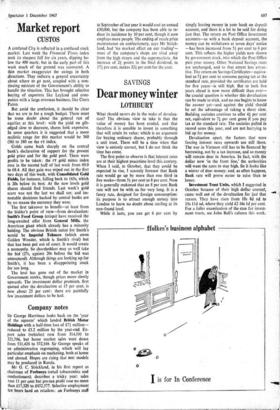Market report
CUSTOS
A confused City is reflected in a confused stock market. Last week the Financial Times index took its steepest fall for six years, dipping be- low the 400 mark; but in the early part of this week much of the ground was recovered. A thin market exaggerates the swings in both directions. They indicate a general uncertainty about where to go next, coupled with a con- tinuing mistrust of the Government's ability to handle the situation. This has brought selective buying of exporters like Leyland and com- panies with a large overseas business, like Coats Paton.
But amid the confusion, it should be clear that we are in for a tough budget. There must be some doubt about the general run of equities at this level : with the yield on gilt- edged slow to decrease, shares look expensive. In some quarters it is suggested that a more realistic range for this market would be 360 (36) to 380 on the Fr index.
Golds came back sharply on the central bank's declaration of support for the present gold price and for the gold pool. There were profits to be taken: the Fr gold mines index rose in the second half of last week from 60.9 to 68.4. All that gain was wiped out in the first two days of this week, with Consolidated Gold Fields, for instance, falling back to 165s, which is 20s below its best. At the new levels gold shares should find friends. Last week's gold scare was not the last we shall see; and im- mutable decisions backed by central banks are by no means the currency they were.
The first takeover to benefit—at least from the bidder's point of view—from devaluation: Smith's Food Group (crisps) have received the long-awaited offer from General Mills, the American giant which already has a minority holding. The obvious British suitor for Smith's would be Imperial Tobacco (which owns Golden Wonder, which is Smith's rival) but that has been put out of court. It would create a monopoly. So shareholders may as well take the bid (27s, against 20s before the bid was announced). Although things are looking up for Smith's, it has been a disappointing stock for too long.
The heat has gone out of the market in Government stocks, though prices move slowly upwards. The investment dollar premium, first quoted after the devaluation at 15 per cent, is now about 25 per cent: there are painfully few investment dollars to be had.
Company notes
Sir George Harriman looks back on the 'year of the squeeze' which landed British Motor Holdings with a half-time loss of £74 million— reduced to £3.2 million by the year-end. Ex- port sales (vehicles) rose from 314,191 to 321,796, but home market sales were down from 531,426 to 372,169. Sir George speaks of an administrative regrouping, which will lay particular emphasis on marketing, both at home and abroad. Hopes are rising that tow models may be produced in Russia.
Mr 0. C. Strickland, in his first report as chairman of Forbuoys (retail tobacconists and confectioners), describes a tricky year: sales rose 11 per cent but pre-tax profit rose no more than £17,320 to £452,577. Selective employment tax bears hard on retailers: on Forbuoys staff at September of last year it would cost an annual £50,000, but the company has been able to re- duce its incidence by 10 per cent, though it now employs more people. The ending of resale price maintenance on confectionery, says Mr Strick- land, had 'no marked effect on our trading'— most of the company's shops are sited away from the high streets and the supermarkets. An increase of 21 points in the final dividend, to 171 per cent, makes 321 per cent for the year.


































 Previous page
Previous page